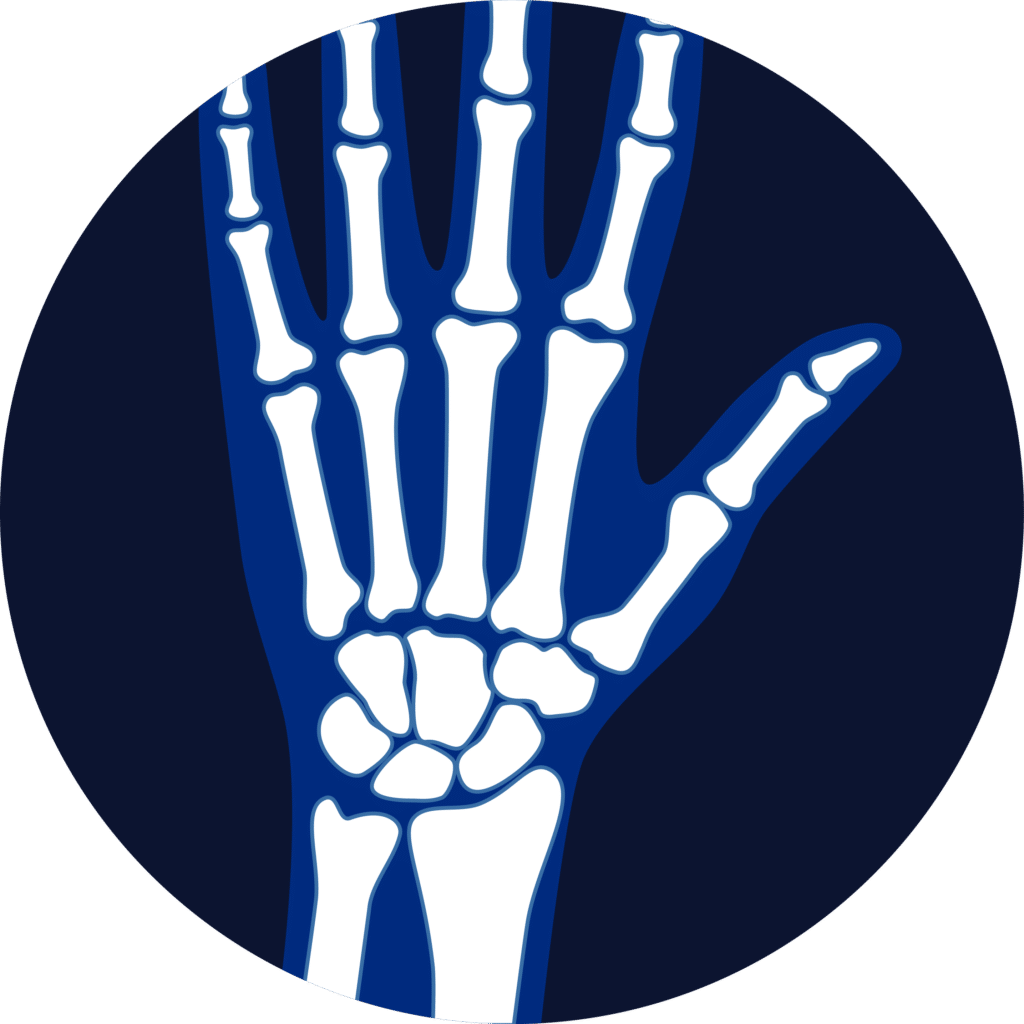Hand and wrist pain can cause discomfort and limitation in daily activities. Learn more about types of pain, their causes, symptoms and treatments.

Hand and wrist pain can be very debilitating and may cause discomfort, limitation in daily activities, or even disability. It is important to identify the source of the pain in order to treat it properly. There are a variety of causes for hand and wrist pain, including:
Treatment for hand and wrist pain will depend on the underlying cause. Regardless of what type of treatment you choose, it should always begin with a proper diagnosis at your doctor’s office so they can help you determine what will work best for you according to your condition’s severity level. Consider visiting our team at Victoria Orthopedic if you are experiencing any discomfort in your hand and wrist.
Trigger finger is a condition in which one or more of the tendons in the finger become inflamed, causing the affected finger to “catch” or lock when bent, resulting in pain and difficulty straightening the finger.
Trigger finger symptoms can be treated with conservative treatment options based on the severity. If conservative treatment options does not improve the condition, surgeons might recommend a minimally invasive surgical procedure. Those who proceed with trigger finger treatment experience restored range of motion and relieve inflammation.
Flexor tendon injuries, which can involve damage to the tendons in the fingers, hands, wrists and arms that control bending of these areas, can result in a considerable amount of pain and reduced mobility due to the disrupted transmission of signals from muscles to bones.
Surgical treatment options for tendon injuries depends on the degree of the tear. Patients who undergo the surgical treatment for tendon injuries will also participate in at least 12 weeks of physical therapy to ensure a full recovery.
Thumb arthroplasty is a reconstructive surgical procedure that involves replacing or repairing worn, injured, or damaged thumb joint surfaces in order to restore function, reduce pain, and improve hand use.
Indications of thumb arthroplasty, also known as arthritis, can gradually become worse overtime. Surgery may be performed if non-surgical treatments are no longer effective. The patients who undergo thumb arthroplasty will experience at least one month in a cast and more post-operative care treatments.
Ganglion Cyst removal is a minimally invasive surgical procedure that involves making a small incision in the skin to remove the cyst, which is typically filled with a clear, jelly-like fluid, and can be done on an outpatient basis with minimal scarring and recovery time.
Diagnosis for cyst is done with a needle aspiration to remove the fluid. In many cases, a ganglion cyst goes away without much treatment. However, surgeons might recommend conservative treatment options to reduce pain. If these treatment options do not work, in rare cases minimally invasive surgery may be recommended. Once ganglion cyst is removed, you’ll be able to resume daily activities within 2 to 6 weeks.
Dupuytren’s Contracture is an abnormal thickening of the connective tissue that causes the fingers and/or palms to curl inward towards the palm, limiting range of motion and causing pain and discomfort for those affected. Dupuytren’s Contracture can be diagnosed with a physical examination.
Treatment options are often non-surgical if conditions are not interfering with daily activities. Depending on the severity of the condition, doctors may recommend other options such as stretching exercises, injections, or aponeuromenty. If conservative treatment options fail due to severe complications, surgical procedures may be recommended. Once treated, patients experience pain relief in the hands and fingers.
Metacarpal consists of 5 long bones in the hand and fractures need immediate treatment. Metacarpal fractures are relatively common injuries which occur in the long bones of the hand typically resulting from a direct impact or fall onto an outstretched hand. Injuries can range from minor hairline cracks to more severe tears that require surgical intervention for successful healing.
Patients who undergo treatments for metacarpal fractures will heal within 3 to 4 weeks with care conditions such as a cast and physical therapy. However, full recovery can take months. Once the hand is completely healed, patients will have restored hand movements.
Open Carpal Tunnel Release Surgery is a minimally invasive outpatient procedure that involves using a small incision to access and release the pressure on the median nerve. This condition can be treated with conservative and surgical treatments. Some conservative treatment options include a splint or brace and therapy. If these options are not working, surgical treatment will be recommended. Open carpal tunnel release surgery is a minimally invasive treatment.
Post-operative care includes procedures such as hand elevation and/or therapy; these measures help provide relief from symptoms such as pain, tingling, numbness, and weakness in the hand, fingers and wrist. Once treated, patients experience pain relief in the hands and fingers.
Mini-Open Carpal Tunnel Release Surgery is an outpatient procedure which involves making a small incision in the wrist and using special tools to divide and release the carpal ligament.
Following the procedure, post-operative treatment such as physical therapy will be recommended. Patients who undergo mini-open carpal tunnel release surgery experience relief from the compression of the nerve that causes carpal tunnel syndrome symptoms such as pain, tingling, and numbness in the hands.
Endoscopic Carpal Tunnel Syndrome is a minimally invasive procedure designed to reduce pressure on the median nerve in the wrist by releasing the carpal ligament. Conditions that lead to endoscopic carpal tunnel include rheumatoid arthritis, presence of cyst or tumor, or trauma.
Some non-surgical treatment options include treating underlying medical conditions. However, if the symptoms persist, it may be recommended to proceed with surgical treatments. The patients who undergo endoscopic carpal tunnel surgery notice improved nerve function, decreased swelling and pain, and improved hand sensitivity.
Trigger finger is a condition in which one or more of the tendons in the finger become inflamed, causing the affected finger to “catch” or lock when bent, resulting in pain and difficulty straightening the finger.
Trigger finger symptoms can be treated with conservative treatment options based on the severity. If conservative treatment options does not improve the condition, surgeons might recommend a minimally invasive surgical procedure. Those who proceed with trigger finger treatment experience restored range of motion and relieve inflammation.
A Scaphoid Fracture is a common wrist injury that occurs when the small bone at the base of the thumb, called the scaphoid, is fractured due to trauma or overuse, and can cause pain, swelling, and difficulty using the affected hand.
Doctors will select the correct procedure for each individual giving consideration to other existing conditions and age of the patient. Scaphoid fractures can also take a long time to heal as it is one of the slowest healing bones in our body making early intervention vital for reducing long-term pain and disability.
Considering this factor, scaphoid fracture needs close follow-up and management as healing often takes two to three months, during which time range of motion exercises must be regularly done to prevent stiffness in the joint for full recovery.
Wrist arthroscopy is a minimally invasive surgical procedure that utilizes small incisions and a tiny camera to visualize and diagnose injuries affecting the wrist joint, such as ligament tears, joint cartilage damage, or arthritis, before performing repairs and reconstructions with specialized instruments.
Utilizing small incisions and a miniature camera, this procedure is used primarily to diagnose wrist irregularities or joint cartilage damage caused by arthritis, giving doctors the capability to ultimately perform repairs and reconstructions through specialized instruments. This technique requires very little recovery time compared to traditional surgical methods, providing patients with greater mobility within as little as a week after surgery.
De Quervain’s Tenosynovitis is a medical condition characterized by pain and swelling of the tendons at the base of the thumb that can cause difficulty with everyday activities such as writing, gripping objects, or turning door knobs.
For doctors to properly diagnose De Quervain’s Tenosynovitis, a physical test and imaging tests are performed on a patient’s hand and wrist area to check for any issues such as inflammation or joint swelling. In order to improve post-diagnosis treatments doctors may require patients to rest their hands or arms during recovery. However, if symptoms persist doctors can conduct surgeries on specific hand muscles, but surgery is only recommended in extreme cases. With correct treatment over time, De Quervain’s Tenosynovitis can greatly reduce in symptoms and normal activities can be resumed once again.
© 2025 Victoria Orthopedic Center, all rights reserved.
Built and Powered by ThriveFuel Marketing..

Specializes In:

Comittees Held:
Specializes In:

Comittees Held:
Specializes In:

Comittees Held:
Specializes In: